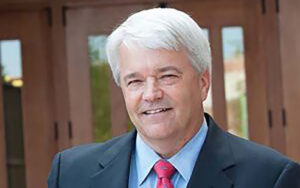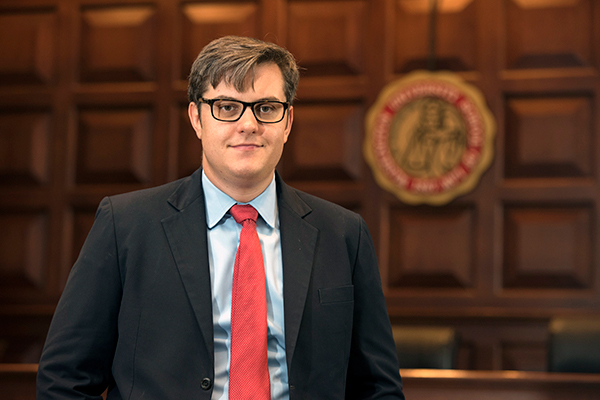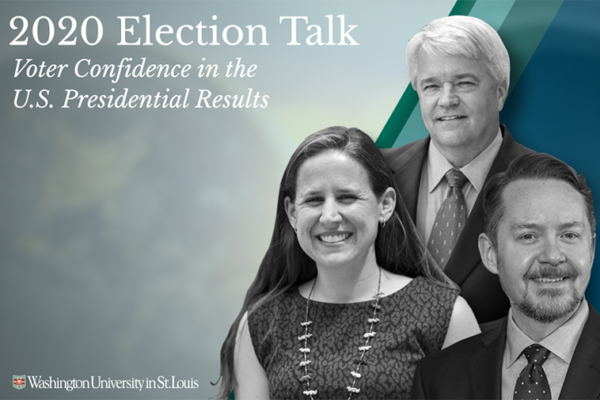Upon the passing Sept. 18 of Justice Ruth Bader Ginsburg, Democrats and Republicans alike wondered what this would mean for the U.S. Supreme Court. With just 45 days until Election Day, will President Donald Trump and Senate Majority Leader Mitch McConnell rush to push through the third SCOTUS nominee of Trump’s administration If so, what challenges will they face?
Daniel Epps, associate professor in the School of Law at Washington University in St. Louis, and Steven Smith, Kate M. Gregg Distinguished Professor of Social Science, weigh in on who has the most to lose before the election if a nomination is completed, how this situation differs from the Senate-stalled Merrick Garland nomination in 2016 while Barack Obama was still president and why the nomination system needs to change.
Epps: Broken system

“Our system, in which control of the Supreme Court turns on who happens to be President when Justices happen to die or retire, makes no sense,” Epps tweeted.
“If President Trump and Senate Republicans push through a SCOTUS nominee under these circumstances, and after Garland, what reason will Democrats have to regard the Court as even the slightest bit legitimate?”
Epps also pointed out that, “contrary to McConnell’s assertion, a Democratic Senate confirmed [Republican] President Reagan’s nominee, Anthony Kennedy, in 1988—a presidential election year.” Epps knows well: He clerked for the late Kennedy.
“I wouldn’t put it past Republicans to say they won’t name someone this year to avoid criticism during the election—and then to ram someone through in the lame duck period [mid-November to mid-January] after voters can’t do anything about it,” Epps said. “Voters should demand every Republican Senator in a competitive election to pledge not to allow hearings until there’s a new President.”
Epps wondered if Ginsburg’s failing health — she died from complications due to pancreatic cancer, and battled various cancers for more than a decade — influenced her court colleagues. Namely, Chief Justice John Roberts.
“One thing I’d love to know is whether CJ Roberts knew the extent of RBG’s health problems when he cast some of his key votes [this past] SCOTUS term. In retrospect, CJ Roberts’ abortion vote was even better for Republican electoral prospects than we realized at the time.”
Last year, Epps and Vanderbilt’s Ganesh Sitaraman wrote a paper “How to Save the Supreme Court,” recommending structural changes for SCOTUS. The article offers two alternative reform proposals: the Supreme Court Lottery and the Balanced Bench. Read more here.
“The problem our article is trying to solve is that Supreme Court justices are more likely to vote along party lines than at any other time in American history, which is presenting a real threat to the court’s legitimacy. We think it’s imperative to rethink how the court works and how justices are chosen before the partisan escalation gets even worse,” Epps said in 2019.
Smith: How will the upcoming election complicate the confirmation process?
In 2016, Senate Republicans refused to consider President Obama’s nominee Garland to replace the late Antonin Scalia and cited a June 1992 speech by then-Sen. Joe Biden. Now, history is repeating itself.

“The ‘Biden rule’ was never much of a rule. In the summer of 1992, then-Senator Biden argued that a vacancy created at that time should not be filled or should be filled by a consensus moderate nominee. Republicans, not Biden or Democrats, later turned Biden’s comments into a ‘rule,’” Smith said
A few Republican Senators already might be counted among the naysayers in any potential Republican movement to push through a nominee in their favor.
“Only Senator Lisa Murkowski [R-Alaska] has indicated her opposition to acting on a nomination this year. I think she means that she would vote against cloture and the nomination, but she may see some wiggle room there,” he continued.
“Collins may find that supporting a quick confirmation process is harmful to her re-election chances, particularly if the nominee is very conservative. She told a [New York] Times reporter earlier this month that she thinks an October confirmation would be a bad idea, but that does not rule out confirmation after the election. Everyone will be eager to have her confirm her view about pre-election confirmation and to see what she says about confirmation in a lame-duck session.
“Other Republicans who will receive attention include Mitt Romney [R-Utah], no fan of the president. I expect that he will make an announcement in the next few days. Cory Gardner [D-New Jersey] is receiving some attention. In 2016, he issued a statement that ‘the next president of the United States should have the opportunity to fill the vacancy on the Supreme Court’ and went on to cite an exaggerated version of the ‘Biden rule.’”
If Trump moves forward with nominating a justice, many Republican Senators may advise that he choose a moderate rather than a conservative.
“Trump has a list and could quickly nominate someone,” Smith said. “He could use this as an opportunity to nominate a moderate to reduce the inevitable tension over a nomination and try to appeal to middle-of-the-road voters. I don’t think that will happen, but there will be a few senators who would advocate that he do so. Even McConnell, anticipating problems with a few of his colleagues, may urge a more moderate choice.”
“Democrats already resent the treatment of Gorsuch in 2016. Rapid confirmation will intensify their frustration.”
Steve Smith
Is McConnell that powerful over this Senate – even as he faces re-election in Kentucky?
“McConnell has announced his intention to get a Senate vote on a nominee, but he is silent on timing. He even may urge the president to delay making a nomination until after the election. He may hear from his colleagues that they do not want a Supreme Court nomination to complicate their re-election efforts. Moreover, the election outcome may affect whether there is a hurry to confirm someone,” Smith said.
Filibustering, votes requested to end debates — clotures — and other stop/stall tactics could clog up the Senate in the coming months.
“Democrats already resent the treatment of Gorsuch in 2016. Rapid confirmation will intensify their frustration. If the presidency and Senate go to the Democrats on November 3, a quick nomination and confirmation will generate interest in expanding the size of the court. Such an effort would be filibustered in the Senate and may spur Democrats to finish off super-majority cloture for legislation,” Smith said




Comments and respectful dialogue are encouraged, but content will be moderated. Please, no personal attacks, obscenity or profanity, selling of commercial products, or endorsements of political candidates or positions. We reserve the right to remove any inappropriate comments. We also cannot address individual medical concerns or provide medical advice in this forum.